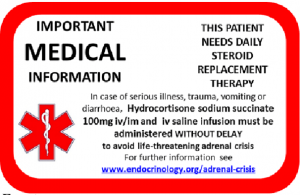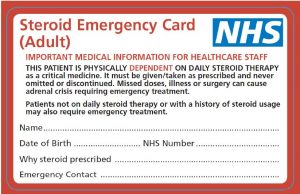Not necessarily a bad one, but you will definitely just need to adapt your previous way of living.
Here are some “tips”.
This is a rare, orphan disease, so you will need a team of medical experts – including mainly an endocrinologist, an oncologist, a surgeon, maybe a nutritionist, radiologist – who will be able to communicate together, as one unanimous voice, about your medical results in the future.
Again, this is a rare, orphan disease so better be safe than sorry! And a second opinion can always help, whether it is in person or remotely. Your medical team could ask for it by themselves.
If you are concerned, and need a remote second opinion, here is a link where you can get one.
After your surgery to remove the adrenal gland (even more if it is a double adrenalectomy) – and if you take Lysodren as it might inhibit the functioning of your remaining adrenal gland – you can be subject to adrenal insufficiency (YouTube video). This can cause vomiting, fainting or even cause death, so you need to have your medications always with you (pill box with hydrocortisone at least), and also your SOLU-CORTEF injection.
The website https://www.nadf.us/ provides interesting information about adrenal insufficiency.
For the same reason, your medical team will probably prescribe you an injection of 100 mg of Hydrocortisone that you need to take with you all the time. Some people need this more often than others, but if you are involved in an accident or are under a situation of huge stress, you might need to do this injection, by yourself , or have it done by someone who knows about your disease and will be able to do it for you, or have it done by the emergency team (EMS) (please note that in the USA, in some states, EMS team are not allowed to perform it unless authorized by a doctor). Your doctors will explain to you how to do it when they prescribe it.
In some countries (like in France), some hospitals organize workshops to learn more about the disease, when to updose and when and how to do the injection. Please do not hesitate to ask for information from your doctor.
See on this YouTube video how to do a Solu-Cortef /Hydrocortisone injection. You can also search with keywords.
See also this one-pager (great to print and keep it with your emergency pack) that shows how to proceed.
Note: Depending on your country, the meds and process might not be the same.
Considering the above, if you are alone, you need the attending medical team to understand what is happening to you.
Depending on the country, it can be an adrenal emergency steroid card in your wallet, like the ones below.
Sources: https://www.researchgate.net/figure/Adrenal-emergency-steroid-card-Permission-to-reprint-granted-by-the-Addisons-Disease_fig1_333752434
https://www.addisonsdisease.org.uk/news/new-nhs-steroid-card-released
You can also have a bracelet/necklace or other accessories that you can wear all the time. (It can still be pretty but needs to be seen!)
Multiple websites are available:


When you are dealing with ACC, you will have to deal with adrenal insufficiency (called Addison’s disease) as well. It means that you need to understand this disease to be able to have the most normal life possible. Most people can live a normal life with few adjustments. Learn to recognize the signs leading to the need to updose or a crisis, in order to avoid them.
Side effects can also mean the side effects of the treatments. The side effects are numerous and can be hard to deal with. Taking other drugs to counteract the main drugs can seem like literally too many pills to swallow but also can improve your quality of life. That’s why we encourage you to be open with your doctors about what you are experiencing (e.g. nausea, vomiting, diarrhea, brain fog… ).It’s up to them to help you find solutions and up to you to choose whether you want them or not.
From now on, you will meet regularly with your medical team until they tell you that you are safe. The number of visits, blood tests, PET-scan (and other exams) will vary from one country to the other, from one stage to the other, so please refer to your medical team.
Facing cancer is hard. Having to travel out of town for treatment can make it even harder. However, in the USA only, the American Cancer Society has a place where cancer patients and their caregivers can find help and hope when home is far away – an American Cancer Society Hope Lodge.
Each Hope Lodge offers cancer patients and their caregivers a free place to stay when their best hope for effective treatment may be in another city. Not having to worry about where to stay, or how to pay for lodging, allows guests to focus on getting better. Hope Lodge provides a nurturing, home-like environment where guests can retreat to private rooms or connect with others. Every Hope Lodge also offers a variety of resources and information about cancer and how best to fight the disease.
Currently, there are more than 30 Hope Lodge locations throughout the United States and Puerto Rico. Accommodation and eligibility requirements may vary by location.
Source: https://www.cancer.org/treatment/support-programs-and-services/patient-lodging/hope-lodge.html
| Cookie | Duration | Description |
|---|---|---|
| cookielawinfo-checkbox-analytics | 11 months | This cookie is set by GDPR Cookie Consent plugin. The cookie is used to store the user consent for the cookies in the category "Analytics". |
| cookielawinfo-checkbox-functional | 11 months | The cookie is set by GDPR cookie consent to record the user consent for the cookies in the category "Functional". |
| cookielawinfo-checkbox-necessary | 11 months | This cookie is set by GDPR Cookie Consent plugin. The cookies is used to store the user consent for the cookies in the category "Necessary". |
| cookielawinfo-checkbox-others | 11 months | This cookie is set by GDPR Cookie Consent plugin. The cookie is used to store the user consent for the cookies in the category "Other. |
| cookielawinfo-checkbox-performance | 11 months | This cookie is set by GDPR Cookie Consent plugin. The cookie is used to store the user consent for the cookies in the category "Performance". |
| viewed_cookie_policy | 11 months | The cookie is set by the GDPR Cookie Consent plugin and is used to store whether or not user has consented to the use of cookies. It does not store any personal data. |

